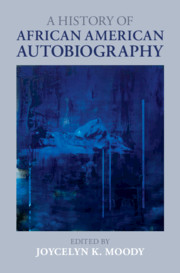Book contents
- A History of African American Autobiography
- A History of African American Autobiography
- Copyright page
- Contents
- Illustrations
- A Chronology of African American Life Writing
- Contributors
- Chapter 1 Crafting a Credible Black Self in African American Life Writing
- Part I Origins and Histories
- Chapter 2 Black Life Writing and Print Culture before 1800
- Chapter 3 Reading the Edited “I” in the Early Black Atlantic
- Chapter 4 Caste and Class in the Antebellum Slave Narrative
- Chapter 5 Nineteenth-Century Autobiographical Writings by Freeborn African Americans
- Chapter 6 African American Life Writing, 1865–1900
- Chapter 7 Black Life Writing in Print Cultures at the Turn into the Twentieth Century
- Chapter 8 New Negro Autobiographies
- Chapter 9 Transnational and Postcolonial Afro-Caribbean Life Writing
- Chapter 10 Writing Race and Remembrance in the Civil Rights Movement Years
- Chapter 11 The Biomedicalization of Black Life Narratives
- Part II Individuals and Communities
- Index
Chapter 4 - Caste and Class in the Antebellum Slave Narrative
from Part I - Origins and Histories
Published online by Cambridge University Press: 30 September 2021
- A History of African American Autobiography
- A History of African American Autobiography
- Copyright page
- Contents
- Illustrations
- A Chronology of African American Life Writing
- Contributors
- Chapter 1 Crafting a Credible Black Self in African American Life Writing
- Part I Origins and Histories
- Chapter 2 Black Life Writing and Print Culture before 1800
- Chapter 3 Reading the Edited “I” in the Early Black Atlantic
- Chapter 4 Caste and Class in the Antebellum Slave Narrative
- Chapter 5 Nineteenth-Century Autobiographical Writings by Freeborn African Americans
- Chapter 6 African American Life Writing, 1865–1900
- Chapter 7 Black Life Writing in Print Cultures at the Turn into the Twentieth Century
- Chapter 8 New Negro Autobiographies
- Chapter 9 Transnational and Postcolonial Afro-Caribbean Life Writing
- Chapter 10 Writing Race and Remembrance in the Civil Rights Movement Years
- Chapter 11 The Biomedicalization of Black Life Narratives
- Part II Individuals and Communities
- Index
Summary
The majority of slave narratives published between 1840 and 1865 were produced by persons who came from what might be termed the elite slave minority, that is, from skilled workers, domestic workers, and headmen. Men and women from the relatively higher echelons of slavery contributed double the number of texts to the mid-century slave narrative than were produced by former field laborers, those who spent most of their working life in slavery doing the most grueling and punishing agricultural labor. In this chapter, class refers mainly to two kinds of differences observable in antebellum slave narratives: differences based on access to and/or control of material resources, such as money, property, and compensation for labor; and differences based on access to or control of social power and prestige based on factors such as occupation, wage earning, family status, and literacy.
Keywords
- Type
- Chapter
- Information
- A History of African American Autobiography , pp. 54 - 68Publisher: Cambridge University PressPrint publication year: 2021

